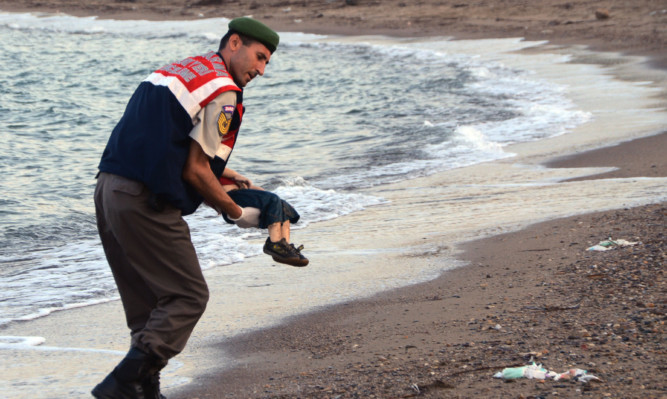It’s almost 31 years since Michael Buerk’s harrowing and moving reports for BBC News on the famine in Ethiopia which sparked an international reaction and led to millions of pounds being raised for aid to be sent to the region.
But will the shocking image of a young boy washed up dead on a Turkish beach influence public opinion on immigration?
The front pages of British newspapers were dominated by the harrowing picture, with some calling on “cold-hearted” David Cameron to re-think his stance on the UK’s refugee intake.
Three-year-old Aylan Kurdi was said to be attempting to cross to the Greek island of Kos with his family, but he and at least 11 others drowned when the flimsy boat they were in collapsed.
The family fled their native Syria last year amid the rise of Islamic State (IS).
A recent British Social Attitudes Survey revealed around 75% of people favoured reduced levels of immigration to the UK.
With Cameron’s Westminster Government promising a referendum on Britain’s EU membership before the end of 2017, polling experts YouGov said yesterday it was too early to say if public opinion had shifted.
From migrants trying to break into the Channel Tunnel at Calais, to concerns about terrorists masquerading as refugees, it’s been argued by some that Britain should sit tight.
But as the Scottish Government indicates its willingness to help, should humanitarianism come first?
Dundee University’s Professor Christian Kaunert, professor of international politics and director of the European Institute for Security and Justice (EISJ), said it’s clear the public are already becoming more sympathetic. He said refugees and migrants had been “muddied” for too long and attitudes were starting to change.
He was not confident, however, that politicians would succeed in solving the crisis at source.
Was military action against IS realistic? Five million refugees had already left Syria, Iraq, Afghanistan, Libya and elsewhere, and needed somewhere to go. He was sure more would follow. It was a real test for the principles of the European Union but where, if at all, should the line be drawn?
North East Fife MP Stephen Gethins, the SNP’s Europe spokesperson and a former political adviser with the Committee of the Regions in the EU, said it was clear Europe is facing the worst “humanitarian” refugee crisis since the Second World War and Scotland, and the UK, needed to take in its share of refugees.
He told The Courier: “This is not a Greek, Italian or Maltese problem, it is a European problem and needs a European solution.
“The Germans, Swedes and others are offering to take in more refugees and the Scottish Government has offered to step up as well. The Westminster Government must take long overdue action on this crisis.”
Mr Gethins said border security was important. But he said the bigger issue here is how a long term strategy for peace is developed.
Labour MEP Catherine Stihler, rector of St Andrews University, noted the boy was one of 6,000 to die in the past two years in search of safety.
She said: “We would all do the same to protect our families. Now is the time for solutions, we cannot talk about how awful the situation is and not take action.”
